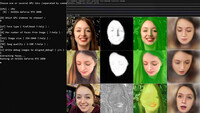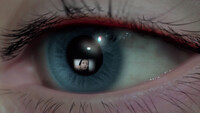Three years ago, a Connecticut college student named Taylor Klein received a DM from a friend. "I'm really sorry," it said, "but I think you need to see this." Attached was a link to a Pornhub page — an odd thing to send to a straight-arrow engineering major like Klein. Opening it, she saw a video of a young woman having sex — a young woman she instantly recognized as... herself. This was very weird, Klein says in "Another Body," an unsettling documentary about the dark world of deepfake porn, because her video Doppelganger was "basically making eye contact with me."
Klein is one of the untold number of women targeted by deepfake creators every year. As the movie demonstrates, it's easy to become one of these sociopaths - there are some 9500 how-to sites all over the internet. All you need to get up and running is, first of all, a target, almost always a woman — one that you, almost always a man, perceive as powerful or famous or otherwise unattainable. Then you search out their social media pages and scrape up maybe 150 images that feature their faces. Then, following a tutorial on a deepfake site, and using ever-improving digital technology, you layer their faces onto the heads of performers in pornographic videos, with the tech synching the expressions on the new faces with the expressions on the faces of the original performers. The result is uncannily convincing.
In "Another Body," directors Sophie Compton and Reuben Hamlyn follow Taylor Klein's journey through this hostile universe. First, after seeing firsthand what's being done with her image, she goes to the police. They don't quite grasp the deepfake thing, however (although one detective says he'd like to take a close look at the footage "to make sure it's you"). The cops are ultimately no help — in part because deepfakes are not a violation of any extant law in most states. (There's no federal law against them either.)
This comports with a general attitude on the part of authorities that since the bodies being shown in deepfake videos are not the actual bodies of the women whose faces have been inserted into the action, no real harm is done. Taylor Klein strongly disagrees. The images are out in the world, she says, "and there's no getting them back. Will people see them in background checks? I was just terrified that there was someone out there who wanted to do this to me. It was a feeling of, like, 'I'm not safe anywhere.' I was in tears,"
Klein next contacts a Los Angeles lawyer named Adam Dodge, who specializes in cases involving "technology and gender-based violence". He explains that since deepfakers usually use Virtual Private Networks (VPNs), they're hard to nail. In addition, Section 230 of the 1996 Communications Decency Act, originally intended to fight revenge porn, also protects sites like 4Chan from being sanctioned for hosting deepfakes — "a spectacular gift" to the tech sector, Dodge says.
The movie takes an unexpected turn when it reveals at one point that Taylor Klein... is actually not a woman named Taylor Klein. And her face — the one we've been watching — belongs to a hired actress. The idea of having the protagonist of a film about deepfakes be a deepfake herself — thus demonstrating the technology — is inspired. "This is the only way I would ever feel safe to tell my story," "Taylor" says.
When the person we know as Klein discovers that a friend named Julia has also been deepfaked, the two women launch their own investigation into the nightmare world that's enveloped them. Soon they find that a number of other women of their acquaintance have been similarly victimized. Since they're all school friends, it seems likely that they must have something — or someone — in common. This is a promising realization, and it energizes the film. But the likelihood of finding these women's tormentor seems remote.
"This is not a phenomenon of weirdos, perverts or oddballs," says another investigator. "There's simply too many of them. The biggest deepfake website I'm aware of is averaging 14-million hits a month. There is no woman in the world who is safe from this technology."
Meanwhile, "Taylor" has become almost philosophical about her chances of ever finding whoever it is who's targeted her. "I'll likely never know," she says. "Sometimes the bad guys actually win."
Kurt Loder is the film critic for Reason Online. To find out more about Kurt Loder and read features by other Creators writers and cartoonists, visit the Creators website at www.creators.com.









View Comments